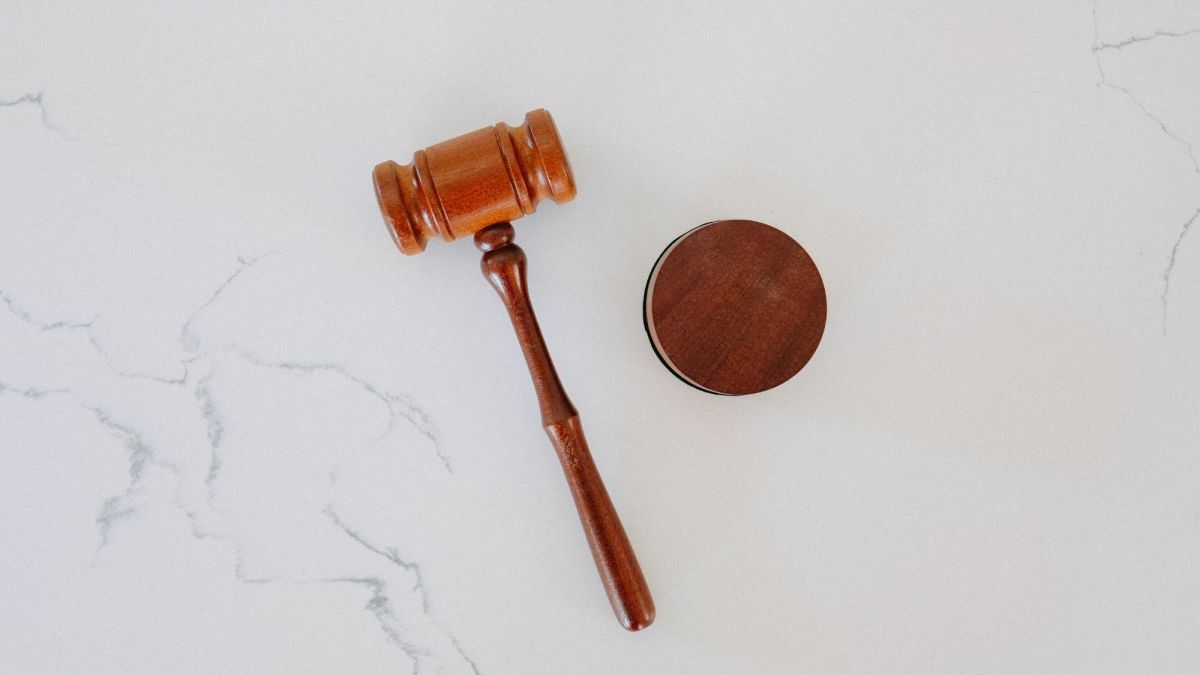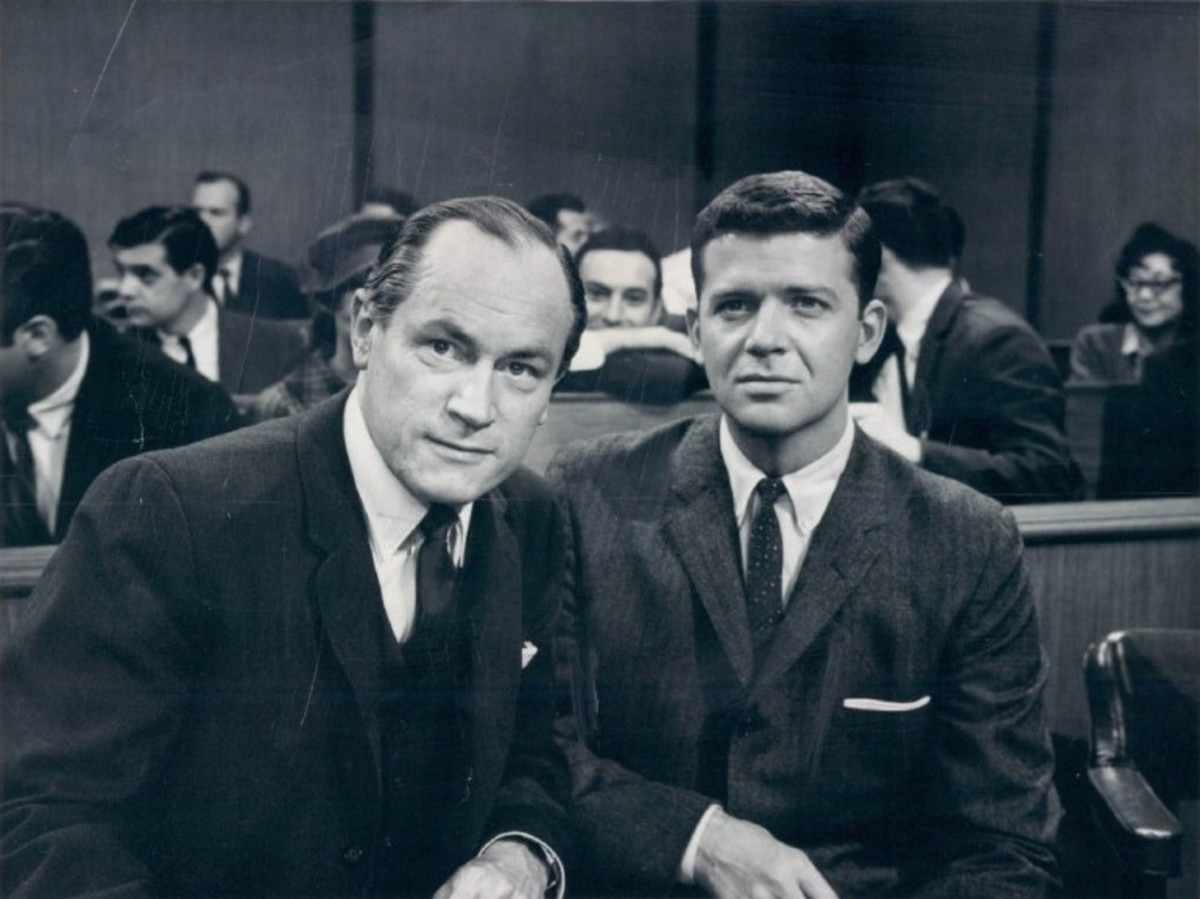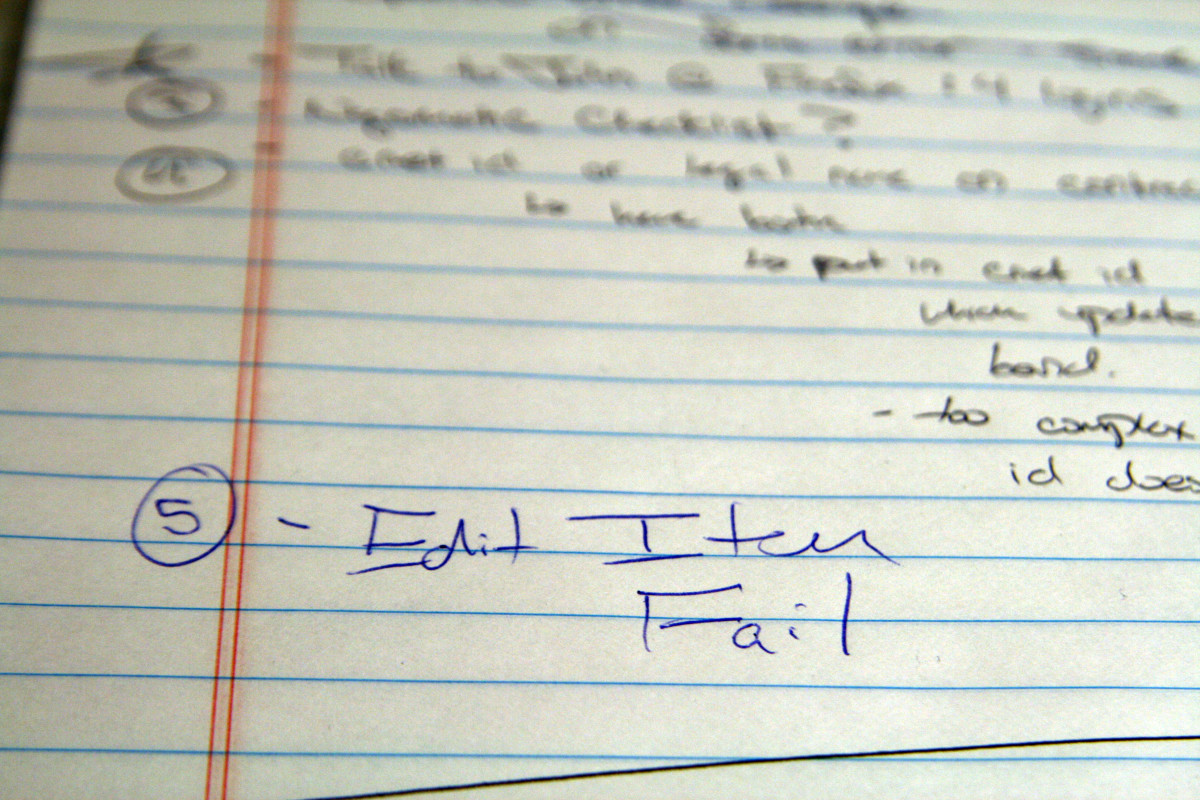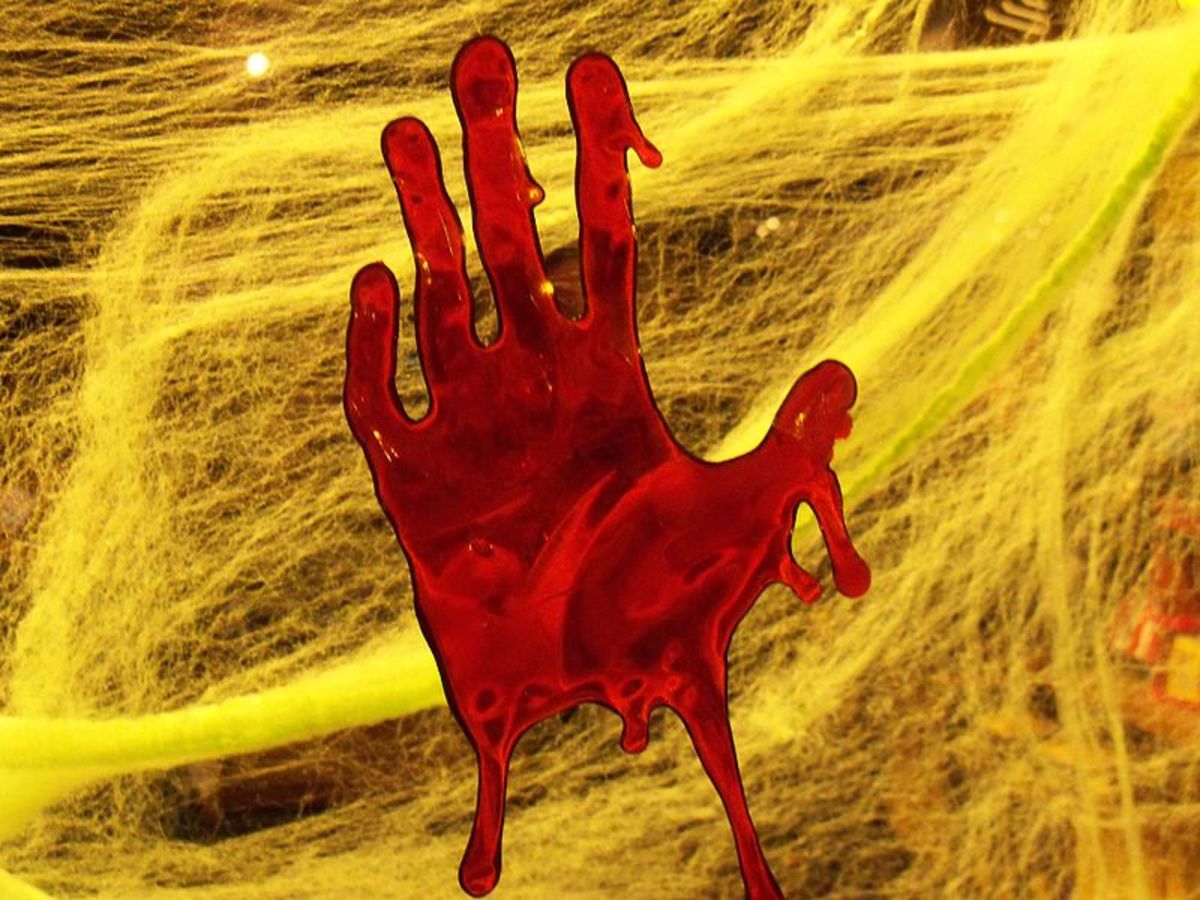Law Admission Tests for UG/Integrated Courses in India: An Overview
Majority of people fail to look beyond conventional popular streams such as medical, engineering and science. However, other streams such as Law, Fashion Designing etc. are now being explored even by very talented students considering the career opportunities existing with these streams. Choices have changed with time as both the students and their parents have found new interests in the legal education in India. Parliament passed a bill to make the Bar Council of India as the supreme regulatory body to regulate the legal profession in India and give it the authority to ensure the compliance of the laws and maintenance of professional standards.
As per the information communicated by Bar Council of India in response to a RTI, there were approximately 1.3 million lawyers in India In 2011 whereas average annual growth rate was around 4 per cent. It shows that demands for legal experts is showing an increasing trend. As per reports appearing in media, dozens of top foreign law companies are queuing up to hire Indian legal experts at junior and middle level. India has the largest pool of English-proficient lawyers that has tempted foreign law firms to aim outsourcing the legal work at a relatively lower price. The current annual value of legal outsourcing ($80 million)is likely to rise to $4 billion. By 2015, there are possibilities that outsourcing may fetch 79,000 jobs in India.
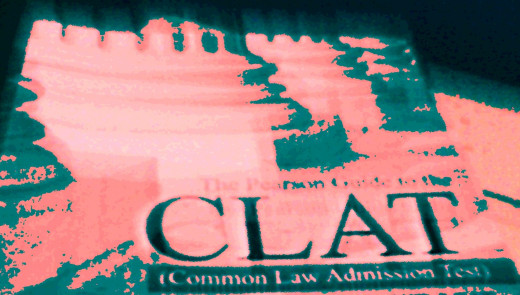
Career prospects
In countless instances, lawyers are involved in our routine activities. One needs lawyers interventions in everyday activities - be it buying property, renting a home, preparing a will, defending us in a court of law etc. After acquiring a law degree, a person may be engaged as an advocate, counselor, legal consultant, barrister or attorney in the legal fields of specialized nature like civil, criminal, taxation, real state law, company law, labor law, corporate law, patents (intellectual property law) and cyber law.
Post & pay scales
To provide an idea about the careers in Indian Legal Services, the following posts existed and 6thCPC recommended the grade pays as shown against the posts.
- Grade Pay Rs 10,000: Joint secretary and Legal Adviser/ Legislative Counsel/Law Officer/Senior Govt. Advocate
- Grade Pay Rs 8700: Legal Adviser/Legislative Counsel/Law Officer/Senior Govt. Advocate (Additional)
- Grade Pay Rs 7600: Legal Adviser/Legislative Counsel/Law Officer/Senior Govt. Advocate (Deputy)
- Grade Pay Rs 6600: Legal Adviser/ Legislative Counsel/Law Officer/Senior Govt. Advocate (Assistant)
Recruiters
Recruiters
Law firms:
Corporate and private Indian and . foreign law firms
Corporate:
BHEL, GAIL, ITC Ltd, IBM, Infosys, etc.
Banking and Insurance Institutions:
Managers, Deputy Managers, Assistant Managers and Specialist Officers etc. are regularly recruited.
Ministry of Law and Justice
As on 1.1.2014, as reported by the Department of Legal Affairs to the 7th CPC, sanctioned strength of personnel in different departments is 2018. Out of the total sanctioned strength, number of Group A, B & C staff is 344, 588 and 1086, respectively and 30 percent of total sanctioned strength was lying vacant as on January 01, 2014. Age profile analysis revealed that about 36 percent of persons in position shall be retiring within the next 10 years as per 7th CPC report.
A candidate must have a bachelor degree to get admission to a 3 year law course leading to LLB degree whereas eligibility criteria for an integrated five year BA/BBA/BSC LLB degree requires successful completion of class XII course from a recognized board.
Law Entrance examinations
Prior to 2007, separate entrance examinations were conducted by both the traditional and autonomous law colleges/universities to admit candidates in a law course. All the tests have different pattern of questions and have different criteria of evaluating candidate knowledge and aptitude. In 2008, seven National Law Universities agreed to conduct the Common Law Admission Test (CLAT) each year on rotational basis as per the seniority order. NLSIU Bangalore conducted first CLAT test on may 11, 2008 and score of the same test was used by seven participating national law schools and three other national law schools including CNLU, Patna, RMLNLU, Lucknow and RGNUL, Patiala. In 2014, fourteen national law universities are participating in counseling based on CLAT score. A brief description of various entrance examination is given below.
CLAT: Pattern of the paper & marks distribution
1. English: 40 Marks
Proficiency in English is tested focusing on understanding of the meanings of words used , theme of the passage, correction of incorrect grammatical sentences, filling of blanks in with appropriate words, etc.
2.General Knowledge: 50 marks
Current Affairs, General Science, History, Geography, Economics, Civics
3. Legal Aptitude: 50 Marks
Legal propositions and a set of facts comprise the questions that are to be answered by the candidates.
4.Logical Reasoning: 40 Marks
Ability to identify patterns, logical links and rectify illogical arguments is tested.
5. Elementary Mathematics (Numerical Ability): 20 Marks
Candidates have to attempt 200 questions carrying 200 marks in 2 hours time. Wrong answers will attract negative marking (0.25 marks for each wrong reply).
Common Law Admission Test (CLAT)
A candidate who is below 20 years of age on 1st July 2014 (22 years if SC/ST ) and have passed a Higher Secondary School/Intermediate (10+2) or its equivalent certificate course with 45% marks in aggregate (40% in case of SC and ST candidates). Appearing candidates in the 10+2 examination may also appear in the test.
Eligible candidates need to apply online at the official CLAT website and make payment using either online or offline mode. General category candidates have to pay Rs 4000 and SC/ST candidate an amount of Rs 3500 as examination fee. Online counseling will be held for the first 2500 candidates drawn from the various categories proportionately(40% extra) in the merit list after an adjustable fee of Rs 1,00,000 is deposited.
Participating institutes include the fourteen NLUs offering five-year integrated under-graduate law courses leading to B.A. LL.B., B.Sc. LL.B., B.B.A. LL.B., B.S.W. LL.B., B.Com. LL.B. (Hons.) degrees and also some private universities.
Courses offered by NLUs
B.Sc. LL.B.: WBNUJS (Kolkata) NLU (Jodhpur) and GNLU (Gandhinagar)
B.B.A. LL.B.: CNLU (Patna) and NLUO (Cuttack)
B.S.W. LL.B. and B.Com. LL.B. (Hons.): GNLU (Gandhinagar)
BA LLB.: Most of NLUs
Admissions in NLUs using CLAT score 2016
Seventeen NLUs admitted candidates based on their CLAT scores of 2016 and analysis of the entire process revealed that preferences of candidates remained more or less for NLU of their choice. Among the General Category, candidates securing AIR 1- 347 could get a seat in top five NLUs as per the first indicative merit list based on preference and merit of candidates. However, further shifting of choices helped candidates securing 438 and above AIR to find a seat in top five NLUs of their choice. Details of seat allotments in top five and rest NLUs is given below.
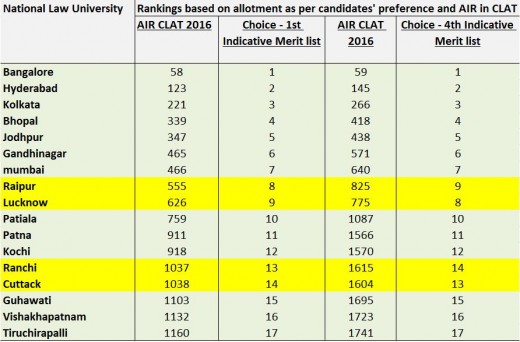
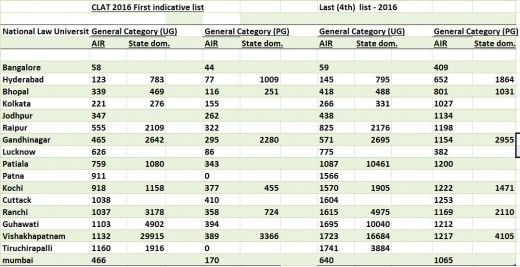
All India Law Entrance Examination (AILET)
B.A., LL.B. (Hons.), a five year integrated undergraduate program, is offered by the National Law University, Delhi that conducts All India Law Entrance Examination (AILET) each year to fill up 80 seats. NLU, Delhi also has a provision to admit 10 foreign students in addition to its regular intake of domestic students.
Candidates having an age of less than 21 years (less han 23 years for SC/ST) on 1st July are eligible to appear in the test. Candidates securing 50% or more marks in class XII or appearing in the examination of 12th may apply. They must secure a minimum of 40 % marks in the AILET examination to qualify for admission.
- Indian Navy: University Entry Scheme (UES) for grant of short service commission to BE/B Tech studen
Indian Navy recruits engineering graduates under the university entry scheme to provide them career building opportunity begging as Sub Lieutenant and becoming Commander on a time scale basis.
There are 150 questions of 150 marks and correct answer to each question yields 1 mark. Candidates have to answer questions within 1 hour and 30 minutes. AILET question paper has different sections similar to CLAT and all the sections have questions with weightage of 35 marks individually except mathematics that has only ten questions worth 10 marks.However, there is no negative marking for a wrong reply.
Candidates appearing in AILET need to answer a total of 150 questions within 90 minutes.There is no negative marking for wrong answers and question paper comprises five sections viz., English (35 marks), General Knowledge (35 marks), Legal Aptitude (35 marks) and mathematics (10 marks).
Symbiosis Entrance Test (SET)
Affiliated law colleges of Symbiosis International University admit students in their law course based on Symbiosis Entrance Test (SET) score. Question paper consists of 150 total marks and time allotted to attempt all the questions is 150 minutes.Eligibility requirements are similar to CLAT with the exemption of cutoff date being a date sometimes in May of examination year.
There are two schools namely Symbiosis Law School, Pune and Symbiosis Law School, Noida that accommodate a total of 180 candidates (BBA LLB - 120, BA LLB-60). Question paper comprises five sections viz., English (40 marks), General Knowledge (30 marks), Legal reasoning (30 marks), Logical reasoning (30 marks)and Analytical Reasoning (30 marks). There is no provision of negative marking to wrong answers.
Expected Ranks and Cutoffs in various entrances
CLAT
CLAT 2016: Examination date is 8th May 2016.
NLSU Bangalore - CLAT Ranks up to 65 ( Cutoff varies - over 139, depending on ease of entrance exam.)
NALSAR Hyderabad - CLAT ranks up to 108 (Cutoff -over 136)
West Bengal NUJS, Kolkata - CLAT ranks up to 260 (Cutoff - over 130)
AILET
AILET 2016: Examination date is Sunday, 1st May,2016 from 3:00 to 4:30 PM
In 2014, fifty two candidates belonging to general category and securing marks between 103-117 out of a total of 150 marks got their names included in the first list for admission to NLU, Delhi.Candidates belonging to SC/ST got their names in the admission list as they secured marks between 81 and 98.
SET
Candidates securing over 110 marks out of 150 marks may succeed in getting admitted to Symbiosis Law School.
Law School Admission Test (LSAT)
Prominent among the 60 or more schools accepting the score of LSAT test,designed by the American Law School Admissions Council (LSAC), are Bishop Cotton Women's Christian Law College, IIT Kharagpur and the Jindal Global Law School. Test is conducted across 16 cities in India and its format is a paper and pencil with multiple choice questions. Candidates need to attempt 92-100 questions within a time limit of 2 hours and 20 minutes.
The LSAT paper is divided into four sections and two sections of paper deal with logical reasoning questions. Other sections contains analytical reasoning questions and reading comprehension questions. Each section has approximately 24 questions, though number may vary. There is no negative marking and hence, candidates may make guesses. LSAT measures critical thinking skills only and does not test specific knowledge pertaining to facts, application of mathematical formulae, and general knowledge.
Banaras Hindu University's (BHU's) BLAT
Admission to B.A. LL. B. (Hons) program of the Faculty of Law, Banaras Hindu University is given based on the score of BLAT. Forms are filled online visiting university's official website. Eligibility criteria requires applicant to qualify 10+2 examination or equivalent recognized by a Senior Secondary Board with a minimum of 50% marks in case of General category applicants (45% in case of OBCs and 40% in case of SC & ST).
DU Law Entrance Examination
The University of Delhi (DU) offers courses at the undergraduate and post-graduate levels inviting application from eligible candidates for admission to LLB/ LLM Programs. A Graduate/ Post Graduate Degree in any discipline from a recognised university with minimum 50% marks (for General category candidates) is the eligibility criteria to appear for entrance examination of LLB program. Application Form can be obtained either in person from the Office of Admission Committee, Faculty of Law after payng Rs 700 (Rs 300 for SC/ ST/ PH category candidates) or downloaded from DU's website.Duly filled in application forms have to be sent by registered post to Coordinator, Admission Committee, Faculty of Law, University of Delhi, Delhi.
Top Coaching Institutes in Delhi
Top coaching institutes have been reviewed and a list of some of the best institutes in Delhi is provided below.
- Success Mantra: www.successmantra.com
- CLAT Possible: www.clatpossible.com
- Manu Law Classes: www.lawenranceindia.com
- Pahuja Academy: www.pahujalawacademy.com
- AB Tutorials: www.abtutorials.com
- Delhi Law Academy: www.delhilawacademy.com
- Delhi Institute of Law: http://delhiinstituteoflaw.in
- Career Launcher: www.careerlauncher.com/delhi
- Juris Academy: www.jurisacademy.com
- Paul Coaching Center: www.facebook.com/paulcoaching.centre



